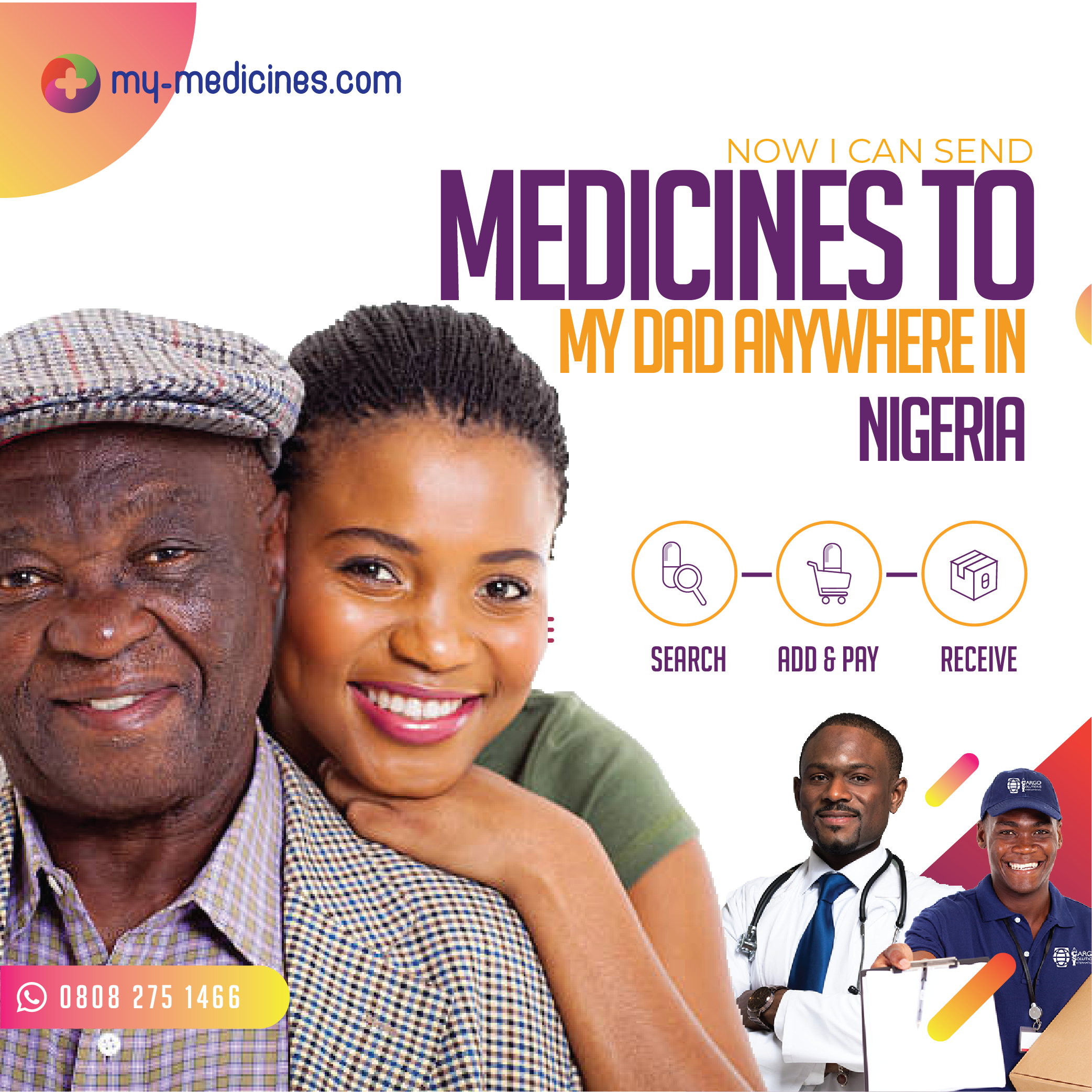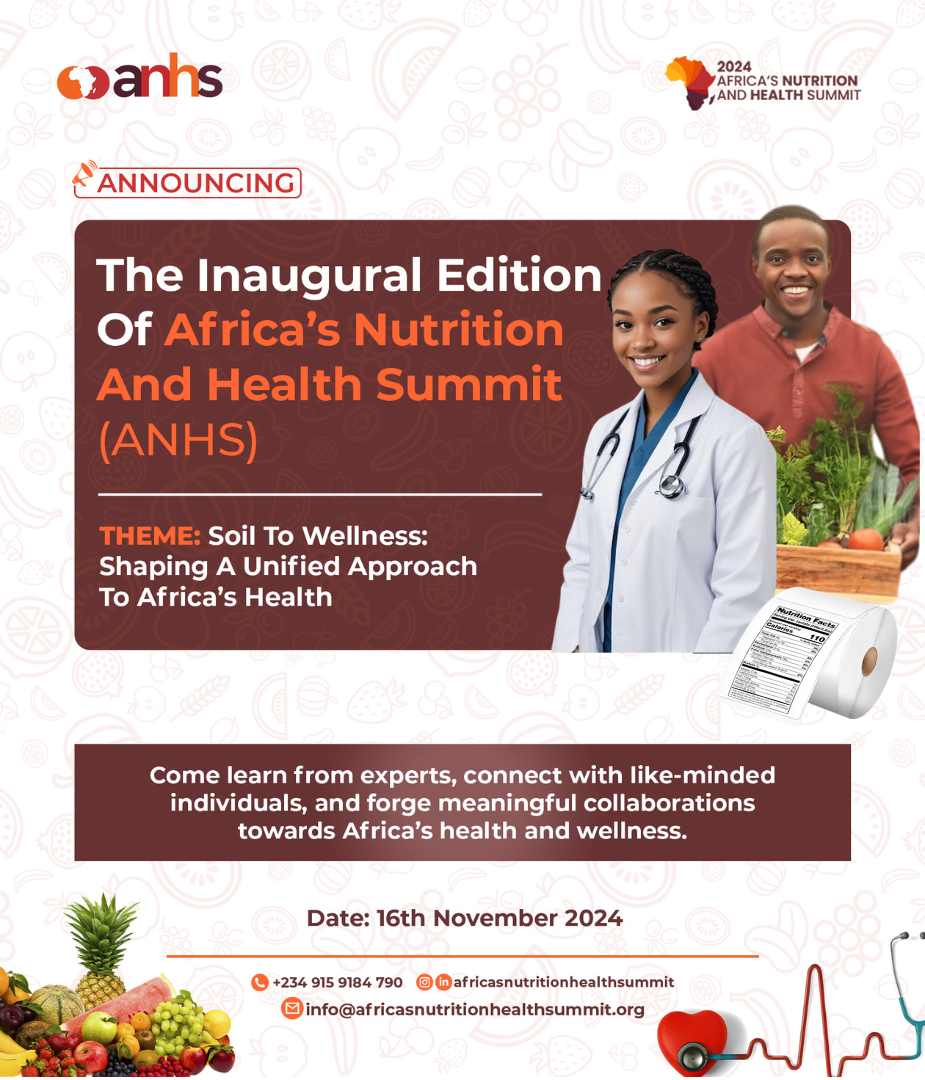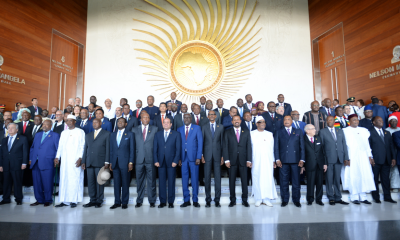Health
My-medicines.com – solving the problem of sustainable access to genuine medicines

The Nigerian healthcare system is in crisis and all hands need to be on deck to sort it out in a sustainable manner. No one appreciates more than we do that building a high-performing health care system which is accessible to all, in our country is a great challenge.
The story of healthcare has been the same for decades, it is riddled with deep challenges at several points of the value chain, some of which include but arenot limited to:
- Open drug markets perpetuating the spread of counterfeit and substandard medicines that weaken treatment solutions, even with fatal consequences.
- Too fewlicensed healthcare services providers to meet the growing demand of the nation’s population
- Absence of sustainable access to genuine medicines and tools which are pertinent to achieve good health and wellbeing
- Medications changing hands too many times before reaching the final consumer in need, driving up cost and driving down quality.
Access to Medicines
To put things in perspective, aPricewaterhouseCoopers report in 2017 showed 17% of essential generic drugs and 30% of anti-malarial are routinely faked in Nigeria and thousands of people die from fake medicines every year.
Also, there are only about 5000 licensed pharmacies available to service the health needs of our growing population. In a country of almost 200 million people, the current numbers show that one pharmacist attends to 14,000 patients in the urban areas and as high as 40,000 patients in rural areas.
It’s important to also mention, according to a 2018 report by Pharmaccess and the Pharmaceutical Council of Nigeria, there are over 950,000 unregistered patent and proprietary medicine stores in Nigeria where medicines could be gotten, often times with no pharmaceutical care involved. Hence, people may end up with either fake medicines or good medicines without proper indication or directions for use leading to the high incidence of drug abuse and misuse seen in Nigeria today.
The people keep losing out!
Every day, approximately 2,300 under-five-year-olds and 145 women of childbearing age die in Nigeria. These deaths are mostly preventable. A major cause is poor access to genuine medications when and where needed. Medicines are scarce because there is lack of information on where they are available.
Where patients even know and have access to licensed pharmacies, they instinctivelyseek to purchasegenuine medicines from the nearest retail pharmacy, but due to stock-out of chronic and essential medicines, absence of licensed healthcare professionals, short dated medicines, patients have to return or visit more premises in search of these medicines. In some cases they have to source the medicines from other countries and for individuals who do not have the means, they visit unlicensed premises and run the risks outlined above!
Our venture is therefore directed at providing ACCESS TO MEDICINES! My-medicines.com aims to solve the problem of sustainable access to genuine medicines, by making medicines easy and quick to find, wherever they exist across Nigeria. We are building the next amazon for medicines, and even better.
Our platform is an aggregated network of over 800 licensed pharmacy premises that leverages block chain technology to the identify where genuine medicines and vaccines are available and deliver to patients and healthcare facilities on demand anywhere in Nigeria. We imagine a world where users never need to look for quality care and medicines but rather, it comes to them.
Users can access the marketplace via their phones or desktop computers, upload prescriptions to be filled by our team of highly skilled pharmacists or just purchase other health products, interact with our pharmacists to make better health decisions and purchases and get purchases delivered to them at home or in the office while we reach out both by mail, instant messaging and phone calls for proper pharmaceutical care services.
We are also gamifying health education for patients to really understand how their body works with other substances especially food and medicines. We believe a well-educated community will make better health choices and limit burden on emergency health services that are already inadequate in Nigeria. THIS EMPOWERS THE PEOPLE with PREVENTIVE HEALTH information. Every progressive nation knows this is the way to go now.
My-medicines.comhas a growing and diverse inventory of almost 10,000 items and it was launched on the 1st of October, 2017, Ourproof of concept showed us the model, systems, processes and technology are sustainable and scalable in every setting.The market has been highly receptive to our solution.
Just ask:
- Mrs W, our new mother who needed Hepatitis B vaccine within 24 hours after delivery but it was not available within her state. My-medicines was able to use its internal network to crowd source this vaccine and deliver within the timeframe she needed it.
- Mr O, Our diabetes and hypertension client who gets his review and refills in the comfort of his home in Sagamu, or
- Mrs A, our diaspora customer who buys medicines on my-medicines.com for her parents, and even siblings (sometimes as surprises), at several others, who have found my0medicines.com as a faster means to sort out some emergencies especially for scarce medicines.
We have partnered with the regulators of medicines in as well as the Association of community Pharmacies in Nigeria to provide their members a greater access to the Nigerian market. Our model is set to scale in two other African countries soon.
We believe in collaboration and partnerships. So anywhere we see potential for increased value-add to our users and network of pharmacies, we are always excited to discuss because for us, Health is the bed rock of a better society.
When access to good health (and medicines) is checked off the list for majority in a society, people can concentrate on better education, food security, a better quality of life and ultimately shared success.
My-medicines.com
Health
Inaugural Pan-African Nutrition and Health Summit set to shape a healthier continent

The inaugural edition of Africa’s Nutrition and Health Summit is set to convene on November 16, 2024, bringing together an extensive network of healthcare practitioners, nutrition experts, agricultural stakeholders, policymakers, and influential leaders from all over the continent under the theme, ” Soil to Wellness: Shaping a United Approach to Africa’s Health.” This groundbreaking summit aims to address the critical rise of non-communicable diseases (NCDs) across Africa through integrative approaches to preventive health, nutrition, and sustainable lifestyle practices.
This movement would explore holistic and practical solutions that unite stakeholders along the health and nutrition value chain, with a critical focus on how surging rates of NCDs like diabetes, hypertension, and obesity can be curbed via sustainable agriculture, improved food quality, and healthier lifestyle choices, to reshape our food and lifestyle culture, thereby laying a foundation for better health outcomes, for generations to come.
A Key Focus on Nutrition and Lifestyle Practices
The summit’s agenda will include panels on integrative approaches to nutrition and preventive health, the dual burdens of malnutrition and obesity, the impact of digital health in preventing diet-related diseases, and the role of sustainable agriculture in food quality. Our holistic approach strives to demonstrate how Africa’s diverse and rich agricultural resources can play a pivotal role in ensuring food security, balanced nutrition, and wellness for all citizens.
Call to Action
The inaugural edition of ANHS is especially relevant to anyone invested in the long-term health and wellness of the African continent. Such stakeholders are not limited to health professionals, nutrition experts, agricultural stakeholders, policy influencers, researchers, food producers, and processors. It is indeed a legacy-defining opening for businesses and community leaders interested in leaving their prints in the sands of policies that would advance health and wellness on the continent.
Participants will gain insights from leading experts and join the cause to champion Africa’s health by focusing on the most essential aspects of disease prevention and overall wellness. Now, more than ever, it is crucial to prioritize wellness at the societal level, addressing the connections between soil health, food quality, and sustainable practices that contribute directly or indirectly to healthy living.
Join us at the inaugural edition of Africa’s Nutrition and Health Summit on November 16, 2024, as we unite to shape a healthier continent – one that intentionally harnesses her resources and expertise to combat non-communicable diseases.
Register here to attend ANHS 2024
For more information, press inquiries, or partnership opportunities, please contact:
RSB
Official Branding Partner of ANHS
Health
Dr. Jesupelumi Adenihun: Adopting a lifestyle of sustainable health practices with food

Dr. Jesupelumi O. Adenihun (Image: Supplied)
You have likely heard the saying, “You are what you eat,” and it couldn’t be truer. What we consume plays a far greater role in our health than many of us realize. Over time, our eating habits can either support our body’s natural healing processes, leading to improved health and vitality, or contribute to nutrient deficiencies, inflammation, and even chronic diseases.
What this means is, our eating habits over time sets off a series of chain reactions in our bodies that impact our overall well-being. The good news, however, is that by consistently making the right food choices, we can put ourselves on the path to a state of good health and well-being. While this might sound daunting at first, it is often the small, consistent actions that yield the best results. Let’s take a look at 10 simple but effective habits you can begin to cultivate for better health and adopt as lifestyle practices:
- Substitute soda with water: No beverage is more refreshing or beneficial than plain water. It hydrates, cleanses, and confers numerous health benefits.
- Snack on nuts and seeds: When you are craving a snack, go for nuts or seeds, unless you have an allergy. They are nutrient-dense and can also be satisfying.
- Opt for grilled or baked over fried: Choosing grilled or baked foods helps reduce unhealthy fat intake without compromising on flavor. This also helps reduce the risk of developing high cholesterol levels which is a cardiovascular risk.
- Enjoy homemade smoothies over sugary drinks: When time permits, make homemade smoothies making use of reliable recipes. If you are short on time, consider vendors who provide fresh, nutrient-packed options.
- Practice mindful eating: Mindful eating means being fully present during meals, savoring each bite, and listening to your body’s signals. Eating mindfully is a game changer for a lot of people.
- Be well-informed about what you consume: Whether it’s food or drinks, it is essential that you stay conscious of what’s in your food and drinks. Many packaged products contain hidden sugars that the body doesn’t exactly need. Always take a moment to check the ingredients.
- Add more vegetables to your plate: Think beyond the usual veggies—some varieties exist which also depends on your geographical location. Be open and willing to explore new options and add color to your meals.
- Prioritize lean proteins: Not all proteins are created equal. Make lean protein choices and consider plant-based options to support your overall health.
- Use natural spices over salt-laden seasonings: High salt intake is known to be a contributor to heart-related conditions like hypertension. Opt for natural herbs and spices to add flavor without carrying on health risks.
- Stay physically active: Find an activity you enjoy and can commit to, whether you are at home or on the go. Consistency is key. Also seek the counsel of a coach if you need to.
Remember, true wealth lies in your health. Let each meal choice you make be a step toward a healthier, more vibrant life. Eat to wealth, health is wealth.
Written By: Dr. Jesupelumi O. Adenihun (Nutrition Coach, Preventive health care specialist).
Health
Bridging The Gap Between Menstrual Health and Mental Health in Africa

Menstrual health is not just about periods; it’s about breaking the cycle of exclusion and empowering the future of Africa – one girl at a time.
Empowering women and girls who menstruate worldwide starts with breaking the silence around periods. Eno, a 14-year-old girl from a remote community in the south, shrinks when her period arrives each month. Shame and fear are a constant part of her experience. “At school, whispers follow me. They call me ‘dirty’ because I can’t afford pads. I use the white piece of cloth my mother gave me and the extra layer of pad I had sewn on our neighbor’s machine using pieces from his shop.” Eno’s story, though heartbreaking, is far from unique. Across Africa, millions of girls and women face a hidden crisis: period poverty.
Period poverty refers to the inability to afford and access menstrual products, sanitation and hygiene facilities, and education and awareness to manage menstrual health. Globally, more than two billion people around the world menstruate monthly.
Menstruation, a healthy and natural biological process continues to be shrouded in silence and stigma across many parts of Africa. This silence perpetuates a cycle of neglect and exclusion, where the menstrual health needs of women and girls are ignored, leading to significant physical and mental health issues.
Daily, women and girls are unable to afford sanitary pads, forcing them to resort to unhygienic alternatives like old rags, leaves, old clothes, cotton wool, toilet paper, newspaper, and make-shift hygienic pads. This lack of access not only affects their physical health but also their mental well-being, as they experience anxiety, shame, and isolation during their menstrual cycles. With limited to no access to safe water and sanitation to manage their menstrual health and hygiene, these women and girls who cannot afford menstrual products do not live well within their rights and freedoms as their menses interrupt their day-to-day flow.
Human-Centered Stories
To truly understand the impact, we must listen to the voices of those affected. Nike, a 15-year-old girl from a rural community in Ogun State shared, “I have to stay home when I have my period because I don’t have pads. I miss out on school and feel ashamed.” Rukkayat, another young woman from a community in Abuja stated, “The stigma around menstruation is so strong that I can’t even talk to my teachers about it. It feels like a dirty secret. I feel dirty walking around my school. So, I’d rather stay at home when I’m on my menses to endure the pain and take care of myself.” These anonymous quotes reflect a common reality for many girls and women across Africa, highlighting the urgent need for change.
Addressing Stigmas and Period Poverty
Period poverty stems from persistent stigmas around menstruation. These stigmas include the belief that menstruating women are impure, leading to their exclusion from everyday activities and social interactions. Such beliefs not only undermine women’s confidence but also reinforce gender inequality. Periods, already a source of physical discomfort, become a breeding ground for anxiety, shame, and isolation. This can lead to depression, decreased self-esteem, and a reluctance to seek help. The link between menstrual health and mental health is undeniable.
To combat these stigmas, sensitization initiatives, and project outreaches need to provide menstrual products and education. These programs will empower girls with knowledge and resources, breaking the silence and changing societal attitudes toward menstruation.
Breaking the Cycle: Investing in Solutions, Empowering Futures
So, how can we bridge the gap between menstrual health and mental health by showing one can’t do without the other? By recognizing that menstrual health is intrinsically linked to mental well-being, we can create holistic approaches that address both.
- Combat Stigma Through Education: Open conversations are key. Educational programs that address menstrual hygiene and dispel myths can empower girls and communities. Schools and communities should provide comprehensive menstrual education that includes mental health support.
- Invest in Sustainable Solutions: Supporting the development and distribution of affordable, reusable menstrual products is crucial. Access to menstrual products should be seen as a basic human right, and efforts should be made to ensure that all girls and women have the necessary resources.
- Build Sanitation Infrastructure: Safe and private sanitation facilities in schools and public spaces are essential for dignity and hygiene management.
- Champion Advocacy: Investing in menstrual health advocacy at the local and national level can lead to policy changes that prioritize girls’ needs. From providing dignity kits to advocating for safe and private facilities, menstrual hygiene management is crucial for their well-being and development. Through advocating for women and girls, we can ensure every girl has the knowledge and resources she needs to thrive.
By investing in menstrual health, we invest in a future where girls like Eno, Nike, and Rukkayat can access education, participate fully in life, and thrive. Through increased conversations and heartfelt advocacy, the Going North Project initiative is addressing the urgent need for quality healthcare, education, and the eradication of period poverty through targeted outreach programs.
The Going North Project aligns with the Sustainable Development Goals (SDGs) of Education, Health, and Gender Equality, which are crucial for fostering a brighter future and empowering girls – one at a time.
Let us address the urgent need for accessible menstrual health resources and education, highlighting how this issue impacts individuals globally. This advocacy inspires and reminds us that menstrual equity is essential for a just and healthy world. Together, we can break the stigma and ensure menstrual equity for all.
-

 Afripreneur1 day ago
Afripreneur1 day agoOluchi Anoruo on building SmartPharm and addressing access to healthcare products
-

 Afripreneur1 day ago
Afripreneur1 day agoRedefining Real Estate Marketing: An Interview with Imelda Usoro Olaoye, Founder of Thinkmint
-

 Economy2 days ago
Economy2 days agoMeta Hosts its First Youth Summit in Nigeria to Drive Innovation and Empowerment
-

 Afripreneur15 hours ago
Afripreneur15 hours agoMeet Datari Ladejo, the digital strategist helping brands thrive in the digital economy
-

 Technology2 days ago
Technology2 days agoLG’s Brand Reinvention: A Global Success Story

















